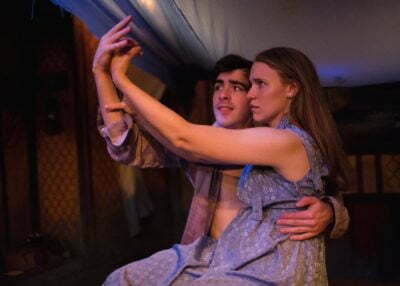R+J: The Vineyard
 Adapted by Janette Bauer and Aaron Sawyer
Adapted by Janette Bauer and Aaron Sawyer
From William Shakespeare’s Romeo and Juliet
Directed by Aaron Sawyer
Produced by Red Theatre Chicago and Oracle Productions
A True Blending of Deaf and Hearing Cultures
Playing around with a story to find new meaning in it works best when it is one the audience is already familiar with. Despite my enjoyment of Oracle’s excellent No Beast So Fierce, playing at the DCASE Storefront through November 8, I was not sure if Richard III is well-known enough to endure being shortened and having the demographic of the titular character changed. Romeo and Juliet, however, shouldn’t present that problem. Besides that it is probably the most widely read play in the English language, it is also frequently adapted to depict its star-crossed lovers as interracial, gay, or on opposite sides of whichever war is topical. R + J: The Vineyard, the new adaptation by Red Theatre managers Aaron Sawyer and Janette Bauer being co-produced with Oracle, goes deeper than that though, in its re-imaging Romeo and Juliet (and Mercutio and the Prince) as deaf. The play is now set on nineteenth century Martha’s Vineyard, where there was an unusually large deaf population, and the native hearing people also made frequent use of a unique, now extinct sign language. About half of R + J: The Vineyard is performed in American Sign Language, sometimes interpreted, sometimes not, and the raw emotions of its characters in Oracle’s very intimate space make this an especially alarming and tragic retelling.

Juliet (McKenna Liesman) is the only deaf member of the wealthy, new-to-the-island Capulet family. Though her nurse (Beth Harris) translates spoken words into the local sign language for her, Lady Capulet (Lona Livingston), the only parent in this adaptation, insists that she rely on lip reading and speaking. Paris (Jeff Kurysz, who also plays Tybalt) makes a clumsy effort to sign to Juliet, but can’t connect with her as easily as Romeo (Brendan Connelly), a deaf member of the native Montagues. That’s largely the basis of their passion; the natives take pride in their culture: signing, agrarianism, insularity, and all, and defend it from people like Tybalt who despise their traditions. Dramaturg Claire Alston’s program note states that newcomers to the island often mistook sign language’s directness and use of facial and body expressions for aggression, and imposed harmful teaching methods on deaf students.

ASL’s incorporation of facial and body language makes it a highly effective way of communicating Romeo and Mercutio’s personalities. Christopher Schroeder plays Mercutio with the character’s usual boisterousness and bravado, with a female Benvolio (Brenda Scott Wlazlo), who is very much his love interest, to translate for the hearing audience. Brendan Connelly holds nothing back as Romeo. His interpretation makes the character seem more than a little unbalanced, so the sincerity of his passions is never in question. Four people are credited as fight collaborators in this production, and their handiwork takes place at extremely close range. Romeo disposes of Tybalt in an astonishingly gruesome manner, and since Kurysz is busy playing Paris in the tomb scene, there’s no moment of reflection with Tybalt’s body. The change in the order of events in the tomb was my least favorite part of the adaptation, because it makes Paris’s death especially unnecessary, but it does conclude Romeo’s character arc.

Overall, Sawyer and Bauer’s adaptation brings out the best in Romeo and Juliet, and in a way that strikes much closer to the heart. There were a few moments when I thought the spoken English and ASL got in each other’s way instead of enhancing the experience, and could have done without interpretation. When Romeo and Juliet sign to each other, they are left untranslated, which is precisely why their conversations are so touching and their behavior is plausible. They really do provide each other with unique solace. Friar Lawrence’s “I see madmen have no ears,” was never classier, but it’s not just individual lines that acquire more biting meaning; the entire situation is much more upsetting than the vague grudge in the original, which could be suspended on a grown-up’s word. When Romeo is exiled, he has to resort to miming to communicate. Given the absence of any other Montagues and our knowledge of what happened to Martha’s Vineyard’s community, I’m not sure how the lovers’ deaths resolve anything, except in the meta-way that R + J: The Vineyard is a successful bridging of two cultures. Which it is, as well as a respectable artistic endeavor in its own right.
Recommended
Jacob Davis
[email protected]
Reviewed October 24, 2015
For more information, see R+J: The Vineyard’s page on Theatre in Chicago.
Playing at Oracle Productions, 3809 N Broadway, Chicago. Tickets are free; for reservations, visit publicaccesstheatre.org, and to learn more, see redtheater.org. Performances are Monday, Friday, and Saturday at 8:00 pm and Sunday at 7:00 pm through December 12. Running time is ninety minutes with no intermission.
